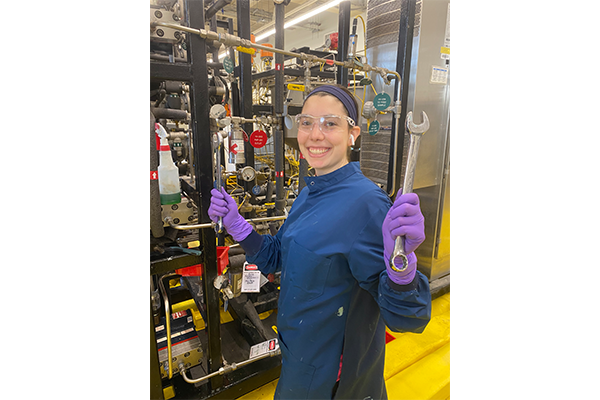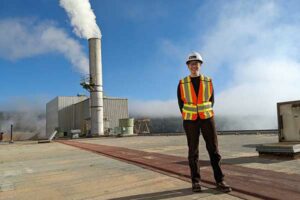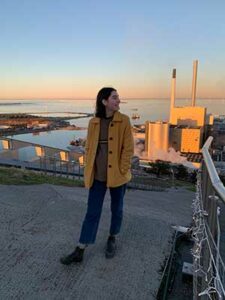Aiding Communities of All Sizes With Clean Water and Renewable Energy

Three unique co-ops helped Rotem Leshed, E’24, environmental engineering, see the endless possibilities as an environmental engineer in a changing, climate-focused world. They also gave her the chance to make an impact on local communities.
Right from the start of her first co-op at Environmental Partners, Rotem Leshed, E’24, environmental engineering, saw the way her work benefited local communities. She started at Northeastern as an environmental science major but switched to environmental engineering after her first semester to make a more direct impact on the industry. Her main project while on her first co-op was helping design and construct a municipal water system for a small town on Cape Cod. Up to that point, the town had only used private wells to get water, but a public source ensured that everyone had better access to clean water. As a coastal town facing rising sea levels, the demand for clean water was higher than ever.
“In coastal areas such as Cape Cod, private wells can get contaminated with sea water,” Leshed says. “Creating one system offers an opportunity to get clean water for everyone.”
She also did extensive field work during this project, which gave her the chance to communicate with residents about the optimal alignment of their service location. Keeping the best interests of the townspeople in mind, Leshed was able to help design a system that benefited the town across the board while keeping everyone happy about its installation.
Her second co-op at Nexamp as an interconnection engineer took her in a different direction. Nexamp is a community solar company that builds solar farms across the country to collect renewable energy by tying it to local electric lines served by National Grid and other utilities. Leshed’s role centered around connecting solar farms to the grid, giving her ample opportunity to gain hands-on experience in the renewable energy field.

Leshed doing field work at a pulp mill while on co-op at Via Separations.
Leshed recently finished her third co-op at Via Separations, a membrane filtration start-up, which marked another change in direction. While in the lab at Via Separations, she saw the process of creating these filtration systems, product testing and system construction. Her work consisted of maintaining the internal systems, including taking apart pumps to analyze and fix their mechanisms. She was also a member of the commercial engineering team, which was working to deploy its first ever membrane filtration system at a pulp and paper mill.
“It was really cool seeing systems like that work and being able to build one from start to finish,” Leshed says.
She says that she owes much of her success on co-op to the inspiration that her professors gave her, especially CEE Teaching Professor Annalisa Onnis-Hayden, her current capstone professor. In a previous environmental sampling course, Onnis-Hayden guided Leshed through a project on removing phosphorus from water using algae. Thanks to her mentorship, Leshed was inspired to expand her horizons and look for different types of co-ops. Jacquelyn Tupper, Leshed’s supervisor at Environmental Partners, also helped her consider new possibilities for future co-ops.
With three co-ops behind her, Leshed is deeply grateful for the opportunity to gain a sense of the professional world early on. She recognizes that her experience was unique and not something that most students would get to try out. As graduation quickly approaches, she says she has newfound confidence about the process.
“If I hadn’t done any of these co-ops, I would not be as confident graduating and starting a job,” Leshed says. “I’ve done a year and a half of experience at three vastly different companies, and I know what to expect now.”
During the spring semester of her third year, Leshed also had the opportunity to study abroad at the Technical University of Denmark. While she was there, she immersed herself both in a different culture and a different type of university.

Leshed at the top of CopenHill while studying abroad in Denmark.
“It was cool to experience a different type of learning. For example, we only had group projects, and there was no assigned homework,” Leshed says. “I was able to travel during the weekends and go to different countries, and I made so many friends.”
Outside the classroom, Leshed is involved in Engineers Without Borders. Her involvement was much heavier in her first three years, and it gave her a solid foundation of information and a way to network with fellow engineers. She now attends only occasionally when she has the time, and her experience with the group allows her to be there as an unofficial mentor to younger students.
This September, Leshed will be starting a new full-time position at Kleinfelder, an environmental consulting firm. During her interview, she felt the breadth of what was possible with the projects she could take on and the people she could work with, which encouraged her to take the position.
“I was drawn to Kleinfelder because I had heard that you can work on a lot of different projects and on things that interest you,” Leshed says. “I’m interested in storm water management, doing field work and making an impact in the community.”
After graduation, Leshed wants to work towards a more climate-resilient world. Having seen the impacts of climate change, she hopes to be a part of Boston’s role in a much larger effort.
“In Denmark, they’re ahead of the game. I saw all these systems in place to adapt to climate change in a very effective way,” Leshed says. “I know that it can be done, and I’m excited to get my hands dirty and make that change here as well. Boston really needs that.”